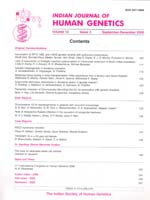
|
Indian Journal of Human Genetics
Medknow Publications on behalf of Indian Society of Human Genetics
ISSN: 0971-6866
EISSN: 0971-6866
Vol. 9, No. 2, 2003, pp. 55-64
|
 Bioline Code: hg03012
Bioline Code: hg03012
Full paper language: English
Document type: Research Article
Document available free of charge
|
|
|
Indian Journal of Human Genetics, Vol. 9, No. 2, 2003, pp. 55-64
| en |
Molecular phylogenetics and functional evolution of major rna recognition domains of recently cloned and characterized autoimmune rna-binding particle
Erhan Süleymanoglu
Abstract
Heterogeneous nuclear ribonucleoproteins (hnRNPs) are spliceosomal macromolecular assemblages and thus actively participate in pre-mRNA metabolism. They are composed of evolutionarily conserved tandemly repeated motifs, where both RNA-binding and protein-protein recognition occur to achieve cellular activities. By yet unknown mechanisms these ribonucleoprotein particles are targeted by autoantibodies and hence play significant role in variety of human systemic autoimmune diseases. This feature makes them important prognostic markers in terms of molecular epidemiology and pathogenesis of autoimmunity. Since ribonucleoprotein (RNP) domain is one of the most conserved and widespread scaffold, evolutionary analyses of these RNA-binding domains can provide further clues on disease-specific epitope formation. The study presented herein represents a sequence comparison of RNA-recognition regions of recently cloned and characterized human hnRNP A3 with those of other relevant hnRNP A/B-type proteins. Their implications in human autoimmunity are particularly emphasized.
Keywords
hnRNP proteins, RNA folding, RNA-protein interactions, Molecular evolution
|
| |
© Copyright 2003 - The Indian Society of Human Genetics
Alternative site location: http://www.ijhg.com/
|
|
